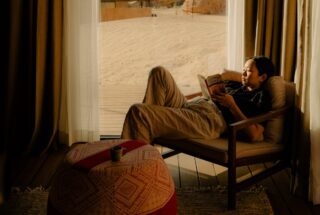This website uses cookies so that we can provide you with the best user experience possible. Cookie information is stored in your browser and performs functions such as recognising you when you return to our website and helping our team to understand which sections of the website you find most interesting and useful.
Entertainment Mindframe founder Adaire Byerly reveals what the creative mind could tell us about business leadership
By Michelle Johnson | 13 October 2020 | Culture
Former model turned neuroscientist and CEO Adaire Byerly has worked with creative organisations to refine their leadership styles

It was during her decade-long modelling career that Texas-born Adaire Byerly first realised there was a problem in the fashion and entertainment industries. Experiencing a culture of “ruthlessness” during her work had caused Byerly to take numerous hiatuses and worry about how she was perceived until, in 2015, she realised that the negative business practices that she had observed had, in fact, become the norm – and, in her view, were putting a billion-dollar industry at risk.
Byerly’s response was to throw herself into the study of human behaviour. She took courses in analytical psychology, philosophy and neuroscience, became certified in cognitive studies and built a team of PhD neuroscientists and psychologists to establish her business. Entertainment Mindframe was born to bridge the gap between creative communication, and producing an effective, growth-based business strategy.
“Anyone in the modelling business will tell you that it’s is not only tough, it can be messed up and ruthless. I found that was mainly because of the people, and the way those people do business,” Byerly tells Tempus. “It would drive me away from the industry for months at a time because I did not have the capacity nor patience to deal with the emotional dynamics. But I was always intrigued by human behaviour, so eventually I challenged myself to do something about it.”
Entertainment Mindframe now works with businesses across the US – particularly in the entertainment hubs of Los Angeles, Las Vegas and Dallas – to implement scientifically based intellectual and developmental training for creative professionals, understand the creative mind, and perform scientific research into neuroplasticity. This, Byerly hopes, will “create a precise solution for workplace efficiency through rewiring our brains”.
“Neuroscience, cognitive behavioural therapy and neuro-linguistic programming all fall under the umbrella of cognitive sciences,” she explains. “It’s a holistic field: it involves philosophy, psychology, anthropology, linguistics and even artificial intelligence. These studies help us understand how the nervous system processes information and influences behaviour – allowing me to identify behaviours and find solutions for my clients.” >>
Changing the game: how ‘The Playbook’ star Patrick Mouratoglou is revolutionising tennis forever

HUMAN BEHAVIOUR
Byerly’s research suggests that what she terms ‘creative minds’ have fundamental difference to those who excel in other fields. Creatives are also surprisingly opposed to what we might consider typical executive behaviour due to the way they perceive success and boundaries – particularly when it comes to the structure of creative industries both here and in her native US.
Understanding the motivations of creative leaders, she says, could reveal many ways to improve the day-to-day business function, growth and culture of these companies.
“Creative industries, such as the fashion and entertainment sectors, have two components that make them distinct. First, they have a wide range of eclectic and creative brains that require a high skill level of artistic production and, secondly, these industries are perceived as ‘glamorous’ and can influence the way the rest of the world measures success,” she says. “These industries can be seen as a platform to showcase your own talent or become famous, rather than as the billion-dollar businesses they are – you’ll often find people name-dropping to enhance public perception of their own success. That type of mental dynamic isn’t common in other industries.”
Byerly, whose clients include production companies providing content for major media networks such as Netflix, Imagine Entertainment by Ron Howard, HBO and CNN, says that to combat these toxic cultures, Entertainment Mindframe works on finding or creating process that protect and enhance productivity for the company, but also does not seem to place limit on creatives.
“It’s almost impossible to conduct business when that dynamic becomes the norm,” she explains, noting that changing culture can be an intricate process. “You have to actively address the behaviours and business practises that negatively affect productivity – things like ego, rebellious or dissociative behaviours, passive aggression, push-back, gossip and power dynamics – not to mention mental challenges, such as anxiety or depression, that may be fuelled by the environment.”
An enormous part of Byerly’s work is addressing corporate communication – not just in terms of how to more effectively interact with employees, but to understand the power that positive communication has to transform real world productivity.
“Lack of communication is the number one issue I am seeing in the environment,” says Byerly. “I often tell my clients that communication is a science as much as it is an art. In any company, if the environment we work in is full of miscommunication and distrust, we will respond negatively as this triggers our survival-mode. It’s crucial to understand the levels and influence of all forms of communication to produce the highest level of efficiency possible for your team and company. »
Ferrari's Jane Reeve tells us why women should be more than passengers in the automotive industry

CHAIN REACTION
Even in companies with an established, positive culture, world events can cause significant impact on a business – both in financial terms to questions of employee wellbeing – as we have seen so vividly in 2020, with the impact of events such as the Covid-19 pandemic and worldwide Black Lives Matter protests inspiring conversations about mental health and diversity in the workplace.
These events can cause a “visceral reaction”, Byerly says, which in turn causes people to make decision based on a “fight, flight or freeze response that takes over rational thinking.” Clearly it’s in this realm where Byerly’s research bears particular interest.
“The job of our brain is to keep us alive and safe, and therefore it’s natural for us to take the path of least resistance,” she says. “That means we may naturally turn away from things that are new or inspire fear. However, the reason creatives are different is because they have a strange ability to bypass this natural pathway. It’s amazing, because they are subconsciously fighting a chemical response on a neurological level.”
This could pave the way for other industries to adapt more quickly and efficiently to drastic changes, too – all through ‘emotional restructure’.
“There was a longstanding belief that our brains were hard-wired by a certain age, but modern discoveries show that we have the power to change the structure of our brains (neuroplasticity) throughout our lives. Emotional restructure is like rearranging a room to make the space more efficient,” she says. “I often hear people say ‘emotions don’t belong in business’, but that’s not how the brain works. Our emotions start in our limbic system, which is subconscious; our hormones alter our neurons, and our neurons change our behaviour. Meaning every decision starts from a cell that travels through your neurological wiring.”
Byerly says this emotional response has been clear in how so many companies around the world have responded to social issues, which in the past may have been considered strictly in the realm of personal matters.
“Many companies and corporations have been responding to the rise of social issues, particularly regarding discrimination and racial biases. Many are releasing statements of support and some are taking it a step further to provide solutions or education within their company, or even to the wider public, to help address concerns,” she says. “With regards to the Covid-19 pandemic and resulting financial crisis, I have noticed many companies are providing webinars and resources for their employees that address mental health during this time, which is a wonderful way to build their
ability to withstand these difficult moments.”
As we come into our ‘new normal’ post-lockdown, and build cultures that support much-needed innovation at all levels, how do we avoid hitting ‘survival-mode’ when confronted with social worries – such as mental health and diversity education?
“The best advice I can give is to remember that this time is a moment,” Byerly says. “It may come across as cold, but I aim to think logically and be an anchor to ground people when we are dealing with emotional responses. We are witnessing human nature, whether that is good or bad, and it is up to each individual to understand the impact of their daily decisions.
“You may think your life does not affect the next person, but it does. Let’s say you do one thing in your day that is morally sound towards 10 people; each of those people knows 10 more. In just one day, you are able to touch 100 people from one act, look or word.”
By beginning with this personalised approach to action, and ensuring one is purposeful across various platforms, Byerly says it’s possible to make positive steps forward without becoming overwhelmed.
“The impact is a ripple effect,” she says. “And we must be cognizant of that in our homes, on social media, in our workplace and in public.”
–
Photo credits:
Photographers: Rebekah Baker Photography, Varoujan Daniel Messier, Kauwuane Burton
Make Up Artist: Bridgett LaDawn
Stylist: Kristin McIntyre







